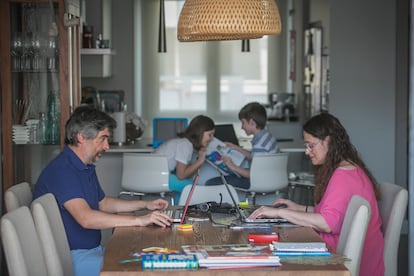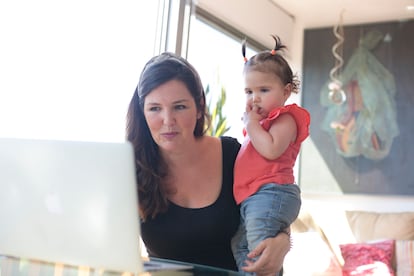How the coronavirus crisis destroyed work-life balance in Spain
The lockdown has given the 4.5 million families in the country with small children an overload of responsibility. Experts are calling for urgent measures
“We mix one thing with the other. Everything gets done at once and everything is done badly: working from home, distance learning, making lunch, looking after the house, the kids, and then it’s time for bed. We don’t have time for anything, not even to take the kids out or to go out ourselves.” This is the situation facing Francisco Reinaldo. He and his wife, Olga Pérez, are currently working four jobs: teachers, parents of eight-year-old twins, IT specialists, and domestic organizers.
Olga works in the mornings from her front room, with the children. But she can’t pay them any attention. Focusing on her work is essential. “It’s like this, day after day, feeling like you are ignoring your children, that they need your help and you can’t give it to them…” she explains. “The house is a disaster… I can’t deal with my life.”
Like this couple, there are 4.5 million other families in Spain with children aged under 14 who are trying to deal with domestic chaos while surrounded by youngsters who have been affected by the coronavirus confinement measures. They have been left without external help, and even the assistance of the grandparents. After two months of lockdown, the unsustainable situation – which in many cases is combined with economic hardship – is threatening to continue beyond the return to school.

Elisa, who has two children, is a teacher. “I’m struggling so much that the other day I forgot to give one of my classes,” she explains. Eva Colera, who is alone with her 12-month-old baby, feels bad about everything. Aisha lives in a room in a shared apartment with her 11-year-old son. They eat thanks to vouchers from Save the Children and La Caixa bank foundation. She’ll be back at work on Monday, and doesn’t know what to do with her child.
Mothers are like Swiss army knives: they work, clean, do the washing… And now they have to take on the roles of teacher and carer-in-chief. A survey from think tank Funcas has found that women are spending 3.6 hours a day supporting their children with homework and entertaining them during confinement, compared to 2.4 hours for men.
Mothers are exhausted. The majority are bearing the burden of their children’s school studiesEmpar Aguado, sociology professor from the University of Valencia
“This is not a country for mothers nor for families,” complains Laura Baena, from the Club de Malasmadres (club for bad mothers), an online community. “They haven’t been a priority during this crisis. We have all the responsibility and we haven’t been offered any solutions [...].”
Empar Aguado, a sociology professor from the University of Valencia, is the co-director of a research project into these exceptional circumstances. “Mothers are exhausted,” she says. “The majority are bearing the burden of their children’s school studies. If they can, it’s normal for them to be working in the early hours.”
This is the case of author Ana Belén Nieto, who writes until 4am while her three children sleep. She gets up at 10am. “My husband leaves the breakfast ready before 7am, when he starts to work from home, and the children look after themselves until I get up.” She studies with them in the morning and cleans in the afternoon. The father makes the lunch. Aguado explains that men have taken on new roles in the domestic arena, “but now that some time has passed, women have to remind them about their tasks.”
Spain was already struggling in terms of work-life balance. More than half of employees have no flexibility in terms of their timetable so that they can take care of their children, and women are seven times more likely to interrupt their careers for this reason compared to men, according to data from the National Statistics Institute (INE).
“In this crisis, we’ve lost the advances made in 10 years in the space of three months,” says Nieto. “And the gender gap could widen indefinitely if the institutions don’t assume the load of caregiving.”

“If this goes on another year, I’ll shoot myself in the head,” says Eva, who has had to attend to her students with her baby girl in her arms. “I really regret having got pregnant.” She accounts for one of the 1.8 million homes in Spain with just one parent, the most vulnerable group right now.
The children are also suffering in the situation. Ana, the four-year-old daughter of Susana Herreras, has started to stutter again. “She won’t stop crying,” her mother explains. “She says that she doesn’t want to do more homework. The teacher suggested that we do it in the summer!”
The nightmare may continue this summer – or not. Some regions, such as Catalonia, have opened the registration process for summer camps, and are working on safety protocols. Private camps, which take on nearly four million children, will open if the government allows it. They are considering isolated enclosures, with high levels of hygiene and no tents. There will be no trips to busy areas.
I’m struggling so much that the other day I forgot to give one of my classesElisa, teacher with two children
What solutions are there to escape from this domestic hell? Economist and consultant José Moisés Martín Carretero explains that “the system is designed to give us rights in public spaces. If these have to close, staying at home should not have to be a barrier to having the same protection. If schools don’t open, they should come to our homes. And there should be a work scheme for caregiving – if you have to go from working 40 hours a week to 20 because the kids are locked up with you, you should have the right to a public benefit.”
Aguado agrees, arguing that the state should support companies so that they reduce working days without cutting salaries. This is one of the measures being prepared in a manifesto by Malasmadres and other organizations. They are also calling for more flexible hours, regulations for home working and economic help for those who can’t work from home.
September is another dark cloud looming. The return to school may not be full time and homes will have to continue to serve as classrooms on a part-time basis. There won’t be computers for everyone, and 10% of students have no internet connection at home. Distancing, limiting classes to 15 students and virtual classes all require more money, both for schools and families.
As well as more money, more ideas are required. Alberto Cateura takes care of his four children, given that his work in event organization has been suspended, while his wife works from home. “There need to be solutions from the schools, for example, so that half of students can go on an excursion or to do sport,” he argues. Camilo Jané, from the FAPA parents association, believes that “spaces outside of schools need to be found” for children.
For now, families have no solutions in sight. The Education Ministry is working on a plan that it will present to Spain’s regions about the return to school in September, but it has released no details so far.
English version by Simon Hunter.
Tu suscripción se está usando en otro dispositivo
¿Quieres añadir otro usuario a tu suscripción?
Si continúas leyendo en este dispositivo, no se podrá leer en el otro.
FlechaTu suscripción se está usando en otro dispositivo y solo puedes acceder a EL PAÍS desde un dispositivo a la vez.
Si quieres compartir tu cuenta, cambia tu suscripción a la modalidad Premium, así podrás añadir otro usuario. Cada uno accederá con su propia cuenta de email, lo que os permitirá personalizar vuestra experiencia en EL PAÍS.
¿Tienes una suscripción de empresa? Accede aquí para contratar más cuentas.
En el caso de no saber quién está usando tu cuenta, te recomendamos cambiar tu contraseña aquí.
Si decides continuar compartiendo tu cuenta, este mensaje se mostrará en tu dispositivo y en el de la otra persona que está usando tu cuenta de forma indefinida, afectando a tu experiencia de lectura. Puedes consultar aquí los términos y condiciones de la suscripción digital.








































